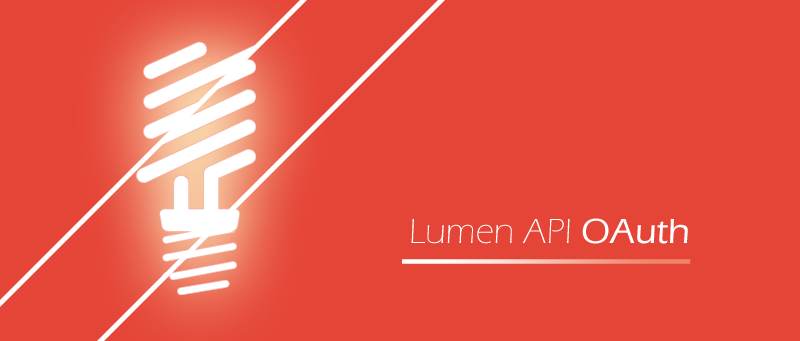https://github.com/omarelgabry/lumen-api-oauth
A RESTful API based on Lumen micro-framework with OAuth2.
https://github.com/omarelgabry/lumen-api-oauth
lumen lumen-api-oauth lumen-framework oauth2 restful restful-api
Last synced: 7 months ago
JSON representation
A RESTful API based on Lumen micro-framework with OAuth2.
- Host: GitHub
- URL: https://github.com/omarelgabry/lumen-api-oauth
- Owner: OmarElgabry
- License: mit
- Created: 2016-04-07T08:24:34.000Z (about 9 years ago)
- Default Branch: master
- Last Pushed: 2017-03-22T13:44:27.000Z (over 8 years ago)
- Last Synced: 2024-04-22T05:16:11.479Z (about 1 year ago)
- Topics: lumen, lumen-api-oauth, lumen-framework, oauth2, restful, restful-api
- Language: PHP
- Size: 80.1 KB
- Stars: 77
- Watchers: 9
- Forks: 42
- Open Issues: 2
-
Metadata Files:
- Readme: README.md
- License: LICENSE
Awesome Lists containing this project
README

# Lumen API OAuth
[](https://travis-ci.org/OmarElGabry/lumen-api-oauth)
[](https://scrutinizer-ci.com/g/OmarElGabry/lumen-api-oauth/?branch=master)
[](https://codeclimate.com/github/OmarElGabry/lumen-api-oauth)
[](https://www.versioneye.com/user/projects/57060d31fcd19a0039f15da4)
[](https://packagist.org/packages/omarelgabry/lumen-api-oauth)
[](https://packagist.org/packages/omarelgabry/lumen-api-oauth)
A RESTful API based on Lumen micro-framework with OAuth2. Lumen API OAuth is a simple application, indented for small projects, helps to understand creating RESTful APIs with Lumen and OAuth2, know how to authenticate and authorize, and more.
The RESTful API for Posts and Comments, where Users can view, create, update, and delete. It provides authorization mechanism to authorize against access tokens using OAuth2, ownership, and non-admin Vs admin users.
:mega: A full tutorial on building a RESTful API with Lumen and OAuth2 can be found on [Medium](https://medium.com/omarelgabrys-blog/building-restful-apis-with-lumen-and-oauth2-8ba279c6a31).
## Index
+ [Installation](#installation)
+ [Terminology](#terminology)
+ [Authorization](#authorization)
+ [Routing](#routing)
+ [Support](#support)
+ [Contribute](#contribute)
+ [Dependencies](#dependencies)
+ [License](#license)
1. Run [Composer](https://getcomposer.org/doc/00-intro.md)
```
composer install
```
2. Laravel Homestead
If you are using Laravel Homestead, then follow the [Installation Guide](https://laravel.com/docs/5.2/homestead).
3. WAMP, LAMP, MAMP, XAMP Server
If you are using any of WAMP, LAMP, MAMP, XAMP Servers, then don't forget to create a database, probably a MySQL database.
4. Configure the```.env``` file
Rename ```.env.example``` file to ```.env```, set your application key to a random string with 32 characters long, edit database name, database username, and database password if needed.
5. Finally, Run Migrations and Seed the database with fake data.
```
php artisan migrate --seed
```
## Terminology
There are some terminologies that will be used on the meaning of the terms used by OAuth 2.0. If you need a refresher, then check [this](https://www.digitalocean.com/community/tutorials/an-introduction-to-oauth-2) out.
## Authorization
Authorization comes in two layers. The first layer authorize against the access token, and the second one is for checking against ownership, and non-admin Vs admin users.
By default, user can delete or update a post or a comment **only** if he is the owner. Admins are authorized to view, create, update or delete anything.
### Access Tokens
The application implements [Resource owner credentials grant](https://github.com/lucadegasperi/oauth2-server-laravel/blob/master/docs/authorization-server/choosing-grant.md#resource-owner-credentials-grant-section-43), which essentially requires the client to submit 5 fields: ```username```, ```password```, ```client_id```, ```client_secret```, and ```grant_type```.
The authorization server will then issue access tokens to the client after successfully authenticating the client credentials and presenting authorization grant(user credentials).
In ```app/Http/routes.php```, A route has been defined for requesting an access token.
### Ownership, & non-Admin Vs Admin Users
Now, after validating the access token, we can extend the authorization layers and check if the current user is owner of the requested resource(i.e. post or comment), or is admin. So, _How does it work?_
**Assign Middleware to controller**
```php
public function __construct(){
$this->middleware('oauth', ['except' => ['index', 'show']]);
$this->middleware('authorize:' . __CLASS__, ['except' => ['index', 'show', 'store']]);
}
```
**Order**
Please note that the middlewares has to be applied in a certain order. The ```oauth``` has to be added before the ```authorize``` Middleware.
**Override isAuthorized() method**
```php
public function isAuthorized(Request $request){
$resource = "posts";
$post = Post::find($this->getArgs($request)["post_id"]);
return $this->authorizeUser($request, $resource, $post);
}
```
In ```app/Providers/AuthServiceProvider.php```, Abilities are defined using ```Gate``` facade.
## Routing
These are some of the routes defined in ```app/routes.php```. You can test the API using [Postman](https://www.getpostman.com/)
| HTTP Method | Path | Action | Fields |
| ----- | ----- | ----- | ------------- |
| GET | /users | index |
| POST | /oauth/access_token | | username, password, client_id, client_secret, and grant_type.
_The ```username``` field is the ```email``` in ```Users``` table_.
_The ```password``` field is **secret**_.
_The ```client_id``` & ```client_secret``` fields are **id0** & **secret0**, or **id1** & **secret1**, ...etc respectively_.
_The ```grant_type``` field is **password**_.
| POST | /posts | store | access_token, title, content
| PUT | /posts/{post_id} | update | access_token, title, content
| DELETE | /posts/{post_id} | destroy | access_token
## Support
I've written this script in my free time during my studies. This is for free, unpaid. If you find it useful, please support the project by spreading the word.
Contribute by creating new issues, sending pull requests on Github or you can send an email at: [email protected]
## Dependencies
+ [OAuth2 Server](https://github.com/lucadegasperi/oauth2-server-laravel/)
## License
Built under [MIT](http://www.opensource.org/licenses/mit-license.php) license.